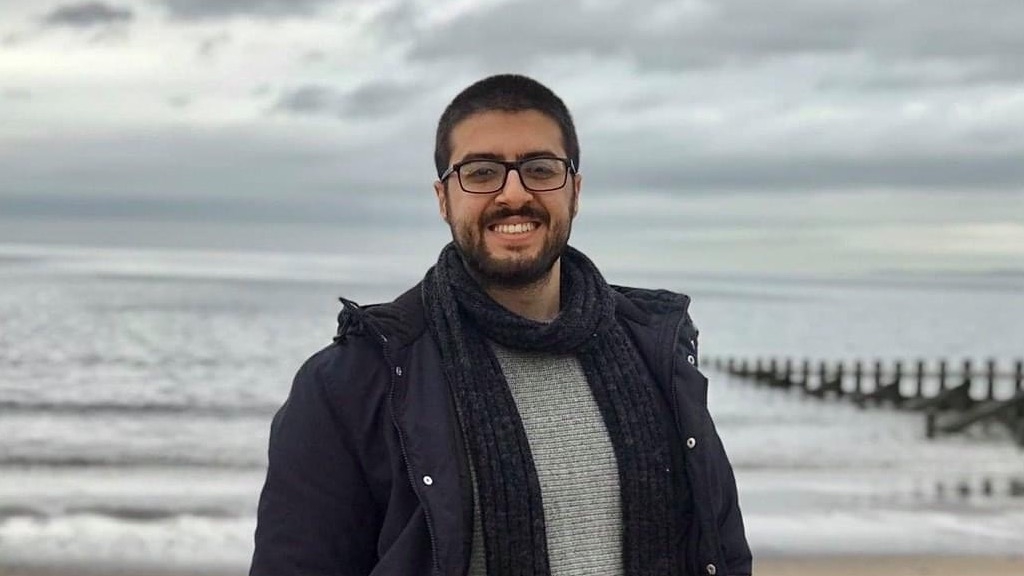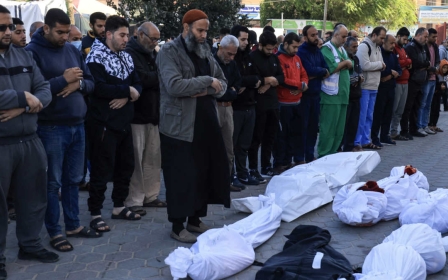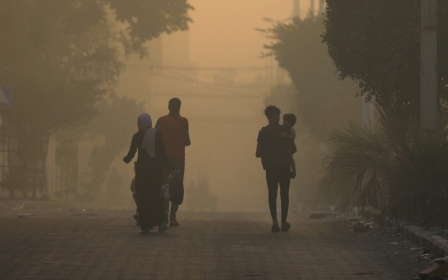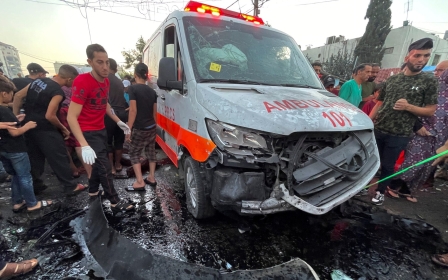Israel-Palestine war: Gaza doctor killed in air strike feared dying under the rubble

Days before Dr Maisara al-Rayyes died in Gaza, he described sitting with his family and being "terrified" by the idea of dying under rubble.
Posting on Facebook, the 30-year-old imagined the last moments felt by families before Israel bombed their homes in Gaza, describing them as "people who were like us, speaking and laughing in their homes" before they died.
But that fear came true when Israel bombed his family home while they were sleeping. Stuck under the rubble of a six-storey building for 60 hours, Rayyes died alongside his family, including his parents, two sisters, and three nephews and nieces.
Although both of Rayyes's brothers survived the first blast, disaster struck again when an Israeli strike killed them the following day on Wednesday, leaving the family with no survivors in Gaza, except Rayyes' sister, who lives abroad.
Described as an "outstanding" and "promising" young doctor by the Palestinian health ministry, Maisara's death marks another blow to the Palestinian medical community as Israel continues its bombardment of Gaza, targeting hospitals and schools.
New MEE newsletter: Jerusalem Dispatch
Sign up to get the latest insights and analysis on Israel-Palestine, alongside Turkey Unpacked and other MEE newsletters
Working as an emergency physician with humanitarian NGO Medecins du Monde in Gaza, Rayyes obtained his first degree at Al-Azhar University in Gaza.
"Maisara was a very loving and caring person. Whenever he knew me or someone else was going through something, he would tell me he'd be there for me
Younis Tamimi went to high school and medical school with Rayyes in Gaza. He used to live metres away from where Maisara's family died and described him as one of his best friends who often talked about helping the Palestinian people.
'Maisara was a very loving and caring person. Whenever he knew me or someone else was going through something, he would tell me he'd be there for me'
- Younis Tamimi, colleague
"A day would not go by where Maisara would not talk about what we could do to help our people," remarked Tamimi.
"Maisara was a very loving and caring person. Whenever he knew me or someone else was going through something, he would tell me he'd be there for me.
"From a young age, he was helping people, and early on, I knew he had a talent that [would] take him places.
"And he was always very loving to his family, particularly his father, because he sacrificed a lot for the extended family and managed through thick and thin to give Maisara's family a good life."
Yasmeen Muhammad also studied at Al-Azhar University, where Maisrara studied.
But despite their age difference, Muhammad recalled how everyone at the university would "know Maisara for his very hard work and leadership spirit".
This talent led him to study in London after the British government awarded Rayyes the Chevening Scholarship in 2019, which funded his master's in Women and Children's Health at King's College London (KCL).
Rayyes then met his wife, Dr Laura Hayek, at KCL, where they studied together. Hayek survived the blast as she was staying with her family in another part of the Gaza Strip.
Thanks to our exceptional #Chevening Alumni for an honest and insightful exchange with UK Foreign Secretary @JamesCleverly on the challenges and aspirations of young Palestinians🇵🇸. Important young Palestinians have a voice. #ChooseChevening #CheveningAlumni pic.twitter.com/nsCP45mZsF
— UKinJerusalem🇬🇧 (@UKinJerusalem) September 12, 2023
Two months before his death, UK Foreign Secretary James Cleverly was also pictured with Rayyes and other Palestinian alumni who had obtained the Chevening Scholarship.
The Foreign, Commonwealth and Development Office directed MEE to the Chevening Scholarship's statement.
"We are devastated to learn about the death of Chevening Alumnus Dr Maisara al-Rayyes and members of his family. We send our deepest condolences to his surviving family," the Chevening Scholarship said in a statement.
"Our thoughts and the thoughts of the Chevening Alumni community are with you."
But many, including the Palestinian ambassador to the UK, criticised the statement as "unacceptable" as it failed to mention that Rayyes had died after Israel struck his home.
On Thursday, dozens of Chevening scholars, past and present, also joined a sit-in outside the London School of Economics to commemorate Rayyes and demand a ceasefire in Gaza.
'Dedication to improving healthcare'
KCL also paid tribute to Rayyes on Tuesday and said he was published in several high-profile journals, including the Journal of Prehospital and Disaster Medicine, where he was well respected and known among his colleagues "for his dedication to improving healthcare for women and children in low-income and war-affected regions".
The university said they planned to organise a memorial to remember his life.
Leanne Mohammed met Rayyes in her first year of university at KCL. She remembered Rayyes as a "warm" character who would often participate in the university's Palestine society and regularly give talks about life in Gaza.
"He was so talented and full of life, just like all the people of Gaza. He actively engaged in the events we would organise and often delivered speeches about Gaza at KCL and other London universities," Mohammed told Middle East Eye.
"Maisara's commitment to his people and country was unwavering. He will forever remain in our hearts as someone who wholeheartedly dedicated his life to the people of Palestine."
Middle East Eye delivers independent and unrivalled coverage and analysis of the Middle East, North Africa and beyond. To learn more about republishing this content and the associated fees, please fill out this form. More about MEE can be found here.




